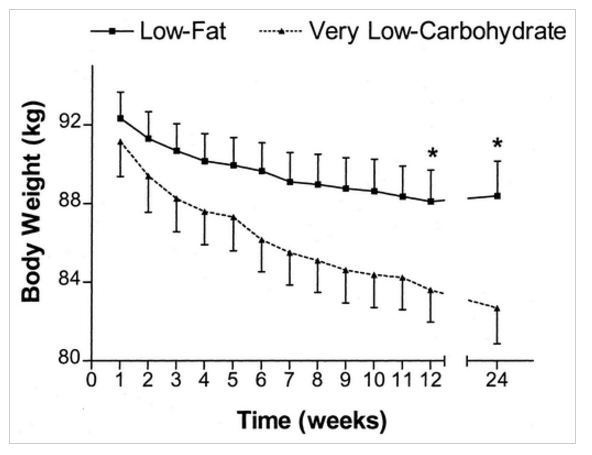How long does it take for your body to become adapted to a low-carbohydrate diet? This question has relevance for everyone trying low-carbohydrate diets for weight loss, and also for a raging scientific controversy.
Living Low-Carb is a diet plan that is designed to lose weight. The book by Fran McCullough has tips on how to adopt a low-carbohydrate lifestyle and tailor a low-carb diet to your needs and preferences for weight loss.
People who avoid carbohydrates and eat more fat, even saturated fat, lose more body fat and have fewer cardiovascular risks than people who follow the low-fat diet that health authorities have favoured for decades, a major new study shows.
Low-carb diets are nothing new and have been used in the medical community for a variety of purposes for more than a century. Based on decades of research, low-carb diets have been linked to benefits including:
- Fast weight loss.
- Reduced hunger.
- Better control over insulin and blood sugar.
- Enhanced cognitive performance.
- Lower risk for heart disease factors.
- Reduced risk for certain types of cancer.
Why Low-carb Diet?
The belief that a low-calorie and low-fat diet aids weight loss has been doing rounds for centuries. However, the fact is that this diet doesn’t really yield results. Even if you stick to the diet religiously, the results will be disappointing.
Living Low-carb: Pros
A few pros of the diet are:
Low-carb diets have been shown to be effective in promoting weight loss. Besides weight loss low-carb can help to reduce cholesterol levels as well
Excess of anything including proteins and carbohydrates – gives you excess calories. And these excess calories are converted to fats and stored in the body resulting in weight gain and obesity
Living Low-carb: Cons
Some drawbacks of the Low-Carb diet are
Eating fewer carbs can make you feel weak, tired, constipated, nauseous, and fatigued
Low carb diet advocates going into ketosis, but the build-up of ketones (by-products of fat metabolism) in your blood is not good. Excess ketones in the blood disturb your metabolism, you lose muscle tissue, minerals from the body, and your brain doesn’t work as well as it should
The diet excludes healthy food items such as milk and high-carb fruits and vegetables like bananas and potatoes which is not good. Rather than excluding healthy foods like milk, vegetables, and fruits you should develop a healthy eating habit –that is eating a nutritionally balanced diet and aim to lose weight
Limiting fruits, whole grains and vegetables can result in vitamins, minerals, and fibre deficiency in your body. If you eat a low carb diet consult a doctor for a multivitamin and a fibre supplement.
On a low-carbohydrate diet, you merely cut the number of carbohydrates in the diet, and in most studies looking at low-carb diets, the dieters ate as much as they wanted. Only carbohydrates were restricted. Cutting carbohydrates lower levels of the hormone insulin, which signals the body to store fat, and which is responsible for setting the body weight set point. The result is nearly effortless weight loss.

- Low-Carb Diets Kill Your Appetite (in a Good Way)
Hunger is the single worst side effect of dieting.
It is one of the main reasons why many people feel miserable and eventually give up on their diets. One of the best things about eating low-carb is that it leads to an automatic reduction in appetite. The studies consistently show that when people cut carbs and eat more protein and fat, they end up eating much fewer calories.
In fact… when researchers are comparing low-carb and low-fat diets in studies, they need to actively restrict calories in the low-fat groups to make the results comparable.
Bottom Line: When people cut carbs, their appetite tends to go down and they often end up eating much fewer calories without trying.
- Low-Carb Diets Lead to More Weight Loss
Cutting carbs is one of the simplest and most effective ways to lose weight.
One of the reasons for this is that low-carb diets tend to get rid of excess water from the body. Because they lower insulin levels, the kidneys start shedding excess sodium, leading to rapid weight loss in the first week or two.
Low-carb diets appear to be particularly effective for up to 6 months, but after that, the weight starts creeping back up because people give up on the diet and start eating the same old stuff.
It is much more appropriate to think of low-carb as a lifestyle, NOT a diet. The only way to succeed in the long-term is to stick to it.
However, some people may be able to add in healthier carbs after they have reached their goal weight.
Bottom Line: Almost without exception, low-carb diets lead to more weight loss than the diets they are compared to, especially in the first 6 months.
Obviously, reductions in the desire to be physically active, experiencing brain fog and being cranky are pretty counterproductive for people looking to feel healthier and lose weight, so this type of side effect is something to monitor yourself for. If you’re feeling very sluggish, moody, or like you have “brain fog” and can’t think clearly while drastically reducing your carbs — especially if you changed your diet rapidly and reduced carbs to very low ketogenic levels — try reintroducing some carbs several days a week until you feel better.




